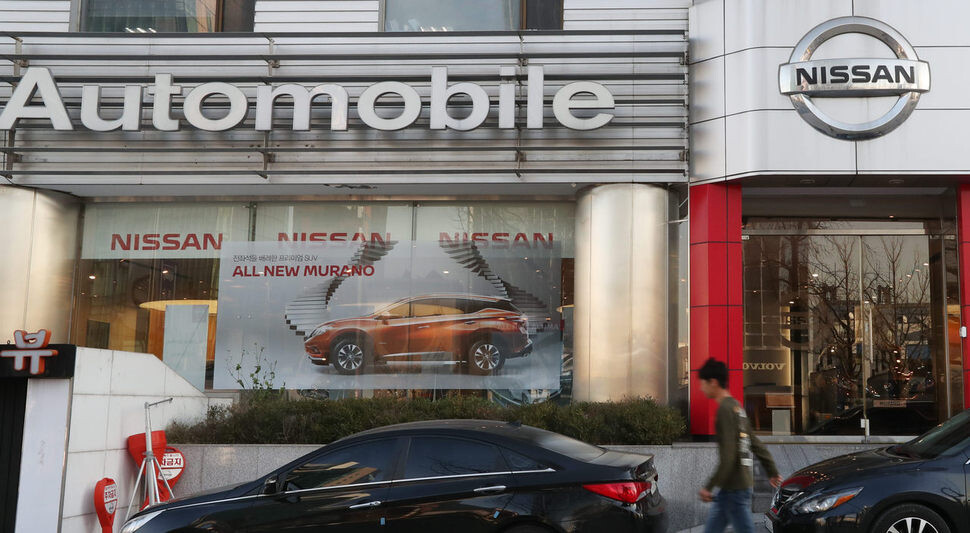hankyoreh
Links to other country sites 다른 나라 사이트 링크
Nissan, BMW and Porsche found to have fabricated documents of cars sold in Korea

Nissan Korea, BMW Korea, and Porsche Korea are latest automakers identified as having fabricated authentication documents for import sales after a scandal involving Volkswagen.
The Ministry of Environment announced on Nov. 29 that it had found errors in certification documents for ten models of car presented by three automobile importers. The ministry had conducted an investigation on all 15 companies importing cars to South Korea after revelations last August that Volkswagen had forged certification documents.
Nissan Korea was found to have altered Mercedes-Benz test scores for self-diagnosis devices on certification documents for its Infiniti Q50 and Renault and self-diagnosis test scores for its Qashqai. The Qashqai also faced fines and certificate revocation after the ministry’s discovery of illegal emissions manipulations last May.
BMW Korea was found to have acquired certification by using test scores for its X6M model on certification documents for its X5M. Porsche Korea altered emissions scores on documents for three models, including the Macan S Diesel, while submitting documents indicating that emissions tests for four models - including the Cayman GTS - had been conducted at facilities certified by the ministry when they had not been. Porsche Korea reported errors in its documents voluntarily after the investigation began.
The Ministry of Environment plans to conduct hearings before handing down certification revocations, sales suspensions, and fines to the companies caught in the act. In the Nissan and BMW cases, it is considering reporting the companies to prosecutors as certification is revoked. According to the Clean Air Conservation Act, forgery of certification documents is punishable by up to seven years in prison and fines of up to 100 million won (US$85,200). Unlike automobile part manipulation and technical defects, errors on certification documents do not lead to recall measures.
“Because administrative measures such as certificate revocation, sales suspensions, and fines are handed down on importers manipulating certification documents, there are no restrictions on when the owners who purchase the vehicles according to lawful procedures operate their vehicles or sell them as used cars,” explained a ministry source.
By Kim Jeong-su, senior staff writer
Please direct questions or comments to [english@hani.co.kr]

Editorial・opinion
![[Column] Tariffs on China: Trump was dumb, Biden dumber [Column] Tariffs on China: Trump was dumb, Biden dumber](https://flexible.img.hani.co.kr/flexible/normal/500/300/imgdb/original/2024/0520/191716191153918.jpg) [Column] Tariffs on China: Trump was dumb, Biden dumber
[Column] Tariffs on China: Trump was dumb, Biden dumber![[Column] What if Seoul took reunification by force off the table? [Column] What if Seoul took reunification by force off the table?](https://flexible.img.hani.co.kr/flexible/normal/500/300/imgdb/original/2024/0520/3017161928630494.jpg) [Column] What if Seoul took reunification by force off the table?
[Column] What if Seoul took reunification by force off the table?- [Editorial] Intensifying US-China rivalry means Seoul must address uncertainty with Beijing sooner than later
- [Column] When ‘fairness’ means hate and violence
- [Editorial] Yoon must stop abusing authority to shield himself from investigation
- [Column] US troop withdrawal from Korea could be the Acheson Line all over
- [Column] How to win back readers who’ve turned to YouTube for news
- [Column] Welcome to the president’s pity party
- [Editorial] Korea must respond firmly to Japan’s attempt to usurp Line
- [Editorial] Transfers of prosecutors investigating Korea’s first lady send chilling message
Most viewed articles
- 1Xi, Putin ‘oppose acts of military intimidation’ against N. Korea by US in joint statement
- 2For new generation of Chinese artists, discontent is disobedience
- 3Kim Jong-un wanted to meet with residents of shelled Yeonpyeong Island in South, Moon recalls in mem
- 4To weigh costs and benefits, Korea must stop treating US troop presence as a sacred cow
- 5[Column] What if Seoul took reunification by force off the table?
- 6[Exclusive] Unearthed memo suggests Gwangju Uprising missing may have been cremated
- 7[Editorial] Transfers of prosecutors investigating Korea’s first lady send chilling message
- 8[Editorial] Intensifying US-China rivalry means Seoul must address uncertainty with Beijing sooner t
- 9Berlin mayor hints at tearing down ‘comfort women’ memorial in city
- 10How K-pop broke the internet — and broke into the US market